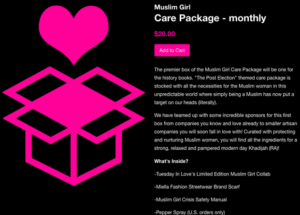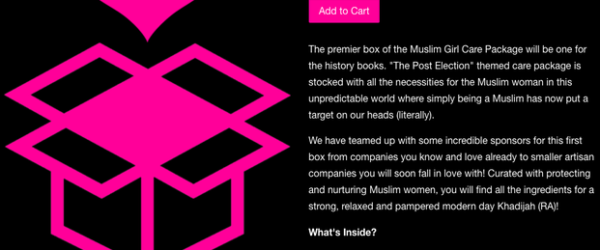Last November, Muslim Girl announced the launch of their subscription boxes. For $20 US a month, you are provided with a box that “intends to package the Muslim woman’s revolution,” offering products to satisfy the needs of Muslim women in today’s world. If you are in Canada, add an extra $15 for shipping. The first #MuslimGirlArmy Care Package was the “Post-Election Care Package,” and it included a Crisis Safety Manual for Muslim Women, pepper spray, a scarf, and cosmetic products like Tuesday in Love, which hold “halal certifications.”
Mainstream media outlets have marketed the boxes as a way to practice self-care for Muslim women, as a way to address the needs of the “modern Muslim woman,” and as a way to equip “women on the front lines.”
Muslim Girl is by no means the first company to launch such an idea; businesses like Halal Goodies and Halal Beauty Box have been pioneers in an industry dominated by non-Muslim cosmetic companies such as Ipsy and Birchbox. Yet, there is something that caught my attention: the commercialization of gendered and racialized violence in the first released box.
At first sight, the product presents itself as an empowerment tool for Muslim women. You know, as a middle-class Muslim woman, you get your package, you feel you are part of the clique. You carry your pink pepper spray and are so “badass” that you will use it against any bigot appearing out of nowhere on your way home. All good, right?
Well, there are a number of problems, in my view, with this. First, let’s talk about the language. The ways in which the capitalist and corporate world have coopted words like “revolution,” “radical,” “resistance,” and so on, really annoys me. These days, for instance, Che Guevara is an item of capitalist consumption in the West, the very same West that demonized his politics and the Cuban Revolution in a variety of ways. Not to mention the fact that most countries in the continent, including both Canada and the US, have criminalized and demonized Indigenous resistance by calling them “radicals,” “revolutionaries,” “terrorists” and “protestors.” Examples include the Zapatista National Liberation Army, Idle No More and Standing Rock’s Water Protectors. Even more irritating is the fact that some racialized feminists, including some Muslim women, think it is okay to use “revolutionary” to describe an online shopping spree. Let’s remember that these labels have gotten racialized people arrested, jailed, exiled, or killed; examples include Angela Davis, Assata Shakur, Anna Mae Aquash, Khalida Jarrar and Shirin Ebadi, among many others.
To ignore the fact that the above labels have been historically connected with marginalized communities, many in anti-capitalist struggles, is to participate in an exercise of erasure. Yet, it also speaks to an important tension between the ways in which we, as racialized women, practice our feminisms. As someone socialized in the feminisms of Indigenous and Third World women, I cringe when some Muslim feminists in the West (although they are not the only ones) see the economic, social and political status of middle-class, cis/heterosexual, white women as the “goal-to-be-achieved.” In my mind such a measure of success is not only anti-Black, but also a challenge to Indigenous sovereignty in its different forms. For many of us, Indigenous and Third World women, feminisms are not about access to capitalist markets and State-given rights, but rather about decolonization, sovereignty and anti-imperialist/anti-capitalist resistance.
Furthermore, to use the language associated with the resistance of some of the most marginalized communities across the continent – and to do so without challenging capitalist, heteropatriarchal, globalized and colonial violence – is an issue. Not only is capitalism incredibly violent towards racialized women, but profiting from terms like “radical” and “revolutionary” obliterates the fact that one needs to operate from within the machinery of white-supremacy and colonial violence to use these terms and be given a platform in mainstream Western and white-focused media outlets, rather than been pushed to the margins. Thus, as an Indigenous-Latinx woman, who also happens to be Muslim, I do not see anything “revolutionary,” “radical” or “resistance-like” about capitalism in the shape of pink pepper-spray.
Let’s also breakdown the concept of “self-care.” In purchasing the subscription box you are meant to “Consider this your monthly reminder to center yourself, care for yourself, and treat yo’self.” If we go with some of the common perceptions of self-care today, we might end up picturing a racialized Muslimah taking a bubble bath after a hard day at the office, wearing Dolce & Gabbana hijabs , haute couture and carrying a Louis Vuitton purse, and paying $20 US for her monthly self-care reminder. In other words, self-care, is often defined as engaging in a leisurely activity, splurging a little and practicing some kind of meditation (yoga is a popular one), as part of a larger context of capitalist imagery (also note, that self-care helps people being productive). Thus, self-care can be a capitalist exercise. In a world that already values (some) racialized women solely for their labour or their proximity to profit, practices of anti-capitalist and feminist self-care and self-love may be much more radical to those whose risk of violence has been heightened.

Image via mic.com.
Now, let’s talk about the #MuslimGirlArmy. It is really easy to talk about gendered and racialized violence in militaristic ways because many of us who live in the US and Canada have been socialized to think that violence is primarily present in war and conflict settings – meaning, in the countries “over there.” And although as Muslims we have been exposed for a while to Islamophobic and racialized violence, some of us still normalize military institutions. Thus, we may see Western armies as super cool institutions with fashionable clothing and aviator glasses, whose personnel are strong, powerful and “badass.” I beg to differ. Armies are extremely violent institutions that have consistently raped, disappeared, tortured and killed racialized women. We have examples from Mexico, Guatemala, Syria, the Democratic Republic of Congo, Kashmir, Palestine and a ton of other places. Not to mention the fact that US and Canadian armies, as well as our beloved Blue Helmets, have been involved in a number of human rights violations entailing gendered and racialized violence against female army members, as well as civilian women and children. To bound Muslim women to the confines of an institution protecting white supremacy and heteropatriarchy is to deny that the feminisms of Indigenous and Black women, as well as women of color, offer so much more than just the same old army tale.
Finally, if this product is aimed to Muslim women “on the front lines” (I wonder why the hierarchy? And whose front lines we are talking about?), why is it for profit? In response to my ranting about this boxes several friends have told me things like, “someone always profits; it may just as well be a Muslim woman.” For me, that’s actually a little worse. One can be a successful business Muslim woman rolling in dough, but if that’s the case, let’s not pretend that we are doing social justice and grassroots activism. When Canadian Muslim women saw a spike in physical attacks in Ontario and Alberta, some communities mobilized to provide resources, support and self-defence classes for free or at low cost. At the end of the day, low-income Muslim women should have access to community resources and the education they see fit to feel safe and be able to protect themselves when they need to. But when you create a product said to help Muslim women stay safe, and then package it as “the” service to get and sell it for $20 US per month, you are sending the message that those who cannot afford it, who do not have a permanent address or who do not have access to online purchasing (lack of credit card or things like Paypal) are not worthy of safety and care and are not part of the envisioned “collective Muslim sisterhood” that sites like Muslim Girl say they appeal to.
To see people, Muslim women or otherwise, profiting from the very real threat of physical, economic, emotional and genocidal violence makes me cringe. Are we for real? Racialized women in Canada and the US are attacked on a daily basis these days and all we can say is, “do self-care, buy my box and enjoy the pepper spray”? As someone who has experienced racialized and gendered violence by strangers three times in the past two months, it deeply offends me that we think this is okay and that this is as good as it gets. In my mind, this is the time when we should be dismantling the very notion of the capitalist settler-state, questioning the ways in which we are bystanders to white supremacy, and creating mechanisms of care to keep each other safe, rather than packaging Muslim women’s trauma into a $20 box.



3 Comments
Unfortunately Muslim Girl is not an activist organization, even if they claim to be. Their capitalist business model precludes them from being considered an organization interested in any social justice. And, as you mentioned, that’s fine as long as they’re clear about it and don’t pretend to be activists or appropriate activism for fame and money.
Excellent article!
Wonderfully written!!! I couldn’t agree more with your take on capitalizing on the fears of Muslim women in the west! Let’s not pretend to be offering a service when all you’re doing is finding a way to profit from the current political climate!